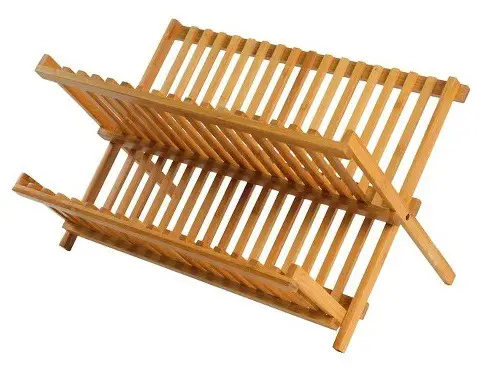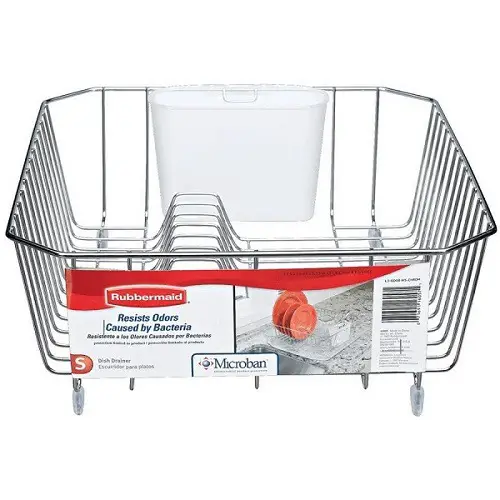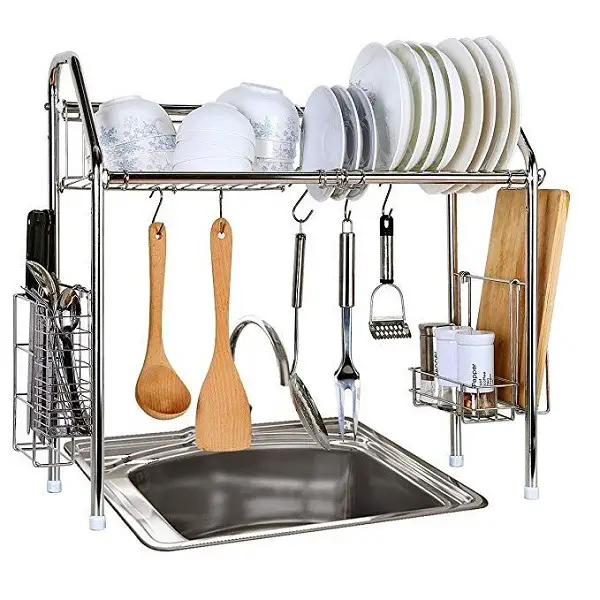A dish rack is one of the best apparatus for organizing the kitchen countertop to help make cooking and cleaning a simple task.
Using dish racks will add order and room in the kitchen while creating a warm and inviting feeling in the room.
[toc]
The design of these racks lets you enjoy good perks when it comes to serving. It lets people dry utensils before placing them in the cabinets, thus saves on the time you would otherwise spend clothe drying your utensils one after the other.
To get the best rack for your kitchen, you should spend some time shopping and read about the different types of racks, user and purchasing guides and other available online resources on the best dish racks.
With racks, drying the dishes is a fast and simple process. You will easily be able to organize your recently cleaned cups, glasses or plates.
This will get rid of the need of wiping the countertop clean with dishes you’ve just washed dripping water.
There are lots of options for dish racks, so you will be spoilt for choice though selecting one to suit your needs may be an issue due to the great variety of options. They are available in different materials like metal, stainless steel, and plastic.
If you like an eco-friendly rack, get environmentally friendly wooden materials like bamboo.

In spite of the different materials, it’s important to make sure they are strong enough. There is an array available in the market that you can select.
Dish rack purchasing guides
It is a difficult task to get the best dish rack due to the various options available in the market. Here are some factors to consider before you purchase a dish rack.
- Easy cleanup
When water stagnates on your dish rack, hazardous fungus and bacteria might emerge and thrive. So, cleaning up the rack frequently is also important.
Fortunately, most racks now come with removable parts, so you will easily disassemble it for clean up. Typically, you just require water and mild soap as the dish rack’s material is usually wood, plastic or stainless steel.
- Material
There are two popular kinds of dish rack material: wood and stainless steel. Plastic dish racks are also gaining popularity. You’ll find other kinds like satin, nylon, plastic.
Wood and steel construction is much more durable and lasts for long. Some products created from plastic look very stylish, are very well-built and will offer great service.
- Size and shape
There are different dish rack sizes and forms to decide on. These racks can be round, rectangular or square, or even small or large.
You should look at the available space on the counter to select the best one. If you have limited space for a rack, do not worry.
Some racks are extendable and foldable. Others can straddle over your sink thus saving you counter space.
It’s easy to adjust to your preferred size. And keep in mind to select the rack with cutlery boxes and slots to hang mugs and hold forks, knives and spoons in a separate area.
- Outside/inside the sink
Some homeowners would prefer placing the dish rack outside the kitchen sink (on the countertop). You might worry that if you leave the drainer on the counter, it will be full of water.
Most products now feature smart designs that let water flow into the sink automatically. This is useful in preventing the growth of mold and mildew and the musty smells that come with them.
Conversely, if you would like to place the drainer on the sink, you need to select the product with the appropriate size that will fit the size of your sink.
- Frequency of use
If you do not regularly cook and do not have lots of kitchen utensils, you don’t have to choose a large capacity dish rack. You need to get one that’s perfect for small homes.
Conversely, if there are lots of people in the household and you’ve got lots of items that need drying, choosing the big size rack is important.
Why you need a dish rack / common uses of dish racks
Here are 5 great ways of using a dish rack to organize the kitchen

- Works like a basket
When thinking of a basic wire dish drainer, it is essentially a basket. You can use it for holding up kitchen linens or snacks on a pantry shelf, which might otherwise simply topple and make a mess.
This means that you can apply the dish rack to more than one use or once you retire it from being a dish rack, you can then use it for holding other items in your pantry.
- Weighing down containers during a dishwasher cycle
During a dishwasher cycle, lightweight, plastic storage containers often become moved around, and when you open the door, you find at least one with its right side up and filled with water.
You can solve this issue by using an old dish rack for weighing the pieces down.
- Organizing all the storage container lids
It can be frustrating to organize storage container lids just as kiddie plates. They all come in different sizes and do not nest together.
Organize them in a dish rack and you will not have to risk having them fall over and creating a mess when you take hold of one.
- Setting up command control
If you prefer using the kitchen as the office for home management or work, you most likely have some supplies and files that require organizing.
A dish drainer will be helpful here, in holding your files upright and offering an area for scissors, pens and more.
- Getting children dishes under control
It is very hard to store children’s dishware. All the plastic containers and kiddie shaped dishes are good for getting your little one interested to eat; however, they do not stack properly and always collapse all over the place.
You can place the dish rack inside the cabinet and make use of the vertical slots for filing plates, and the tines for keeping cups and bottles in place.
- Drying your fruits and veggies
Dish racks can also come in handy in draining water off your cleaned fruits and vegetables. This saves you the trouble of having to dry them with a clothe before storing them away.
If you are thinking of upgrading your dish rack, you can consider using your old dish rack as a fruit and vegetable holder on a permanent basis.
How to arrange your dish rack
It appears that dish racks will do more in the kitchen than simply holding your wet cookware. When being used for this purpose, you will position it on the counter top next to your sink or over the sink if the rack is designed as an over the counter dish rack.
You can also position a dish drainer inside one of the kitchen drawers or cabinets. This will help in organizing all the lids to the cookware in one area, or to properly store your plates and saucers.
How to use a dish rack to organize your home
If you regularly feel like the kitchen sink is accumulating dishes you do not want to clean, a rack will help you feel you’ve got more room for getting your dishes done.
A dish rack will also help organize your home as it is the best area for storing your dishes to dry. For this reason, you will not have to spend your valuable time drying them before putting them away.
How to clean a dish rack
After washing dishes with your hand, you want to make sure you’re putting them on a clean rack to dry.
Because of all the water draining from your dishes onto the rack, these racks are the best mildew and mold breeding ground.
Cleaning your dish rack each week will help in preventing it from forming and harboring mold and mildew.
In case it forms, makes sure you sanitize the dish drainer and kill all mildew and mold and allow it to dry, preferably outside where it can air properly.
Cleaning up a dish rack is just like cleaning up a dish. There are 4 simple steps.
What you will require:
- Hot water
- Dish soap
- Small scrub brush or a toothbrush
- Step one: Disassemble
Dismantle the dish rack if you can, for easier cleanup. Disassembling it will ensure you reach all those hard to reach areas.
- Step two: Scrub
Over the sink, use hot water to wet the toothbrush or scrub brush. After that, add a dab of dish soap, and get rid of the stains by gentle scrubbing.
Ensure to scrub the whole rack thoroughly along with focusing on the stains and the hidden corners.
- Step Three: Rinse
Ensure that you rinse off all the soapy water and check the rack for spots you might have missed.
- Step four: Allow drying entirely
If you have a metal dish rack, use an absorbent rag or cloth to dry it off manually to help in preventing rust. You can leave racks of other materials to dry in your sink.
How to prevent a dish rack from rusting or molding
The right of way of preventing rust, mold and mildew from forming on the rack is cleaning it up frequently. You should always ensure it’s dried entirely after use.
Cleaning up the dish drainer once weekly can ensure that the growth of bacteria and mold is kept at a minimum and helps keep the dish rack looking brand new.
Oxidation forms when metal gets exposed to water, so the faster you can dry the rack off, the less likely it is to rust.
In addition, it is important that you take care when you handle sharp items around a vinyl-coated or metal rack. The reason being, scratches will probably harbor water and cause rusting.
If the dish rack has tiny rust spots, you can dry the place and use electrical tape to wrap it to prevent the spread of rust.
If the joint has rust or has started corroding the metal, it might be time to get a new one.
Additional ideas and tips
- Is the rack occupying too much counter space? If you have a cabinet over the kitchen sink, you can cut out its bottom and install the rack inside. Your dishes will drip into the kitchen sink and you will get more counter space.
- If there’s no tray on your dish rack, place a cookie sheet under it for catching drips. This sheet will dry a lot quicker than a towel and help in preventing mildew.
- When you need to replace the rack, think about using it in a cabinet for organizing cookware, serving trays, or other things that you can rack rather than stacking.
- If excess water remains in the tray after drying the dishes, put them away and then towel dry or dump out the dish tray to prevent mildew.
- If you like placing a towel under the dish rack, you should replace it every day at least to prevent the growth of mold. It’s good to hang it after every use to allow it to dry totally.

